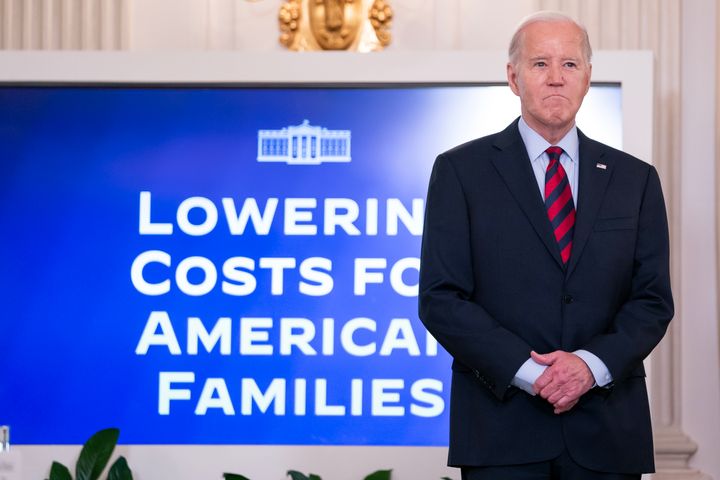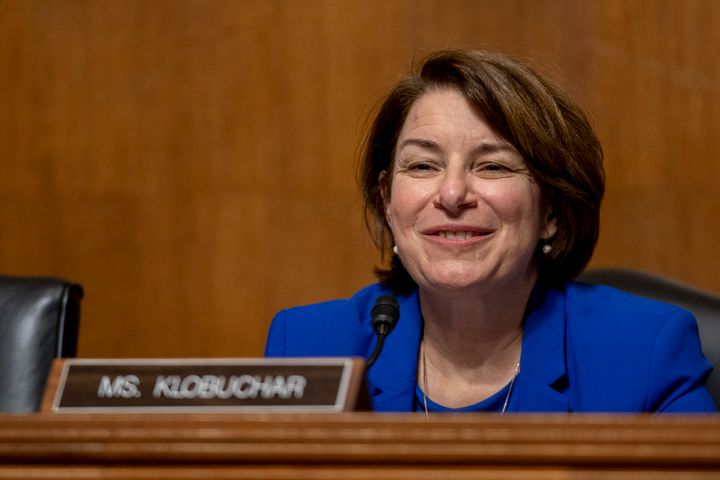President Joe Biden previewed a key piece of the agenda he plans to tout Thursday at the State of the Union address by holding a meeting Tuesday of economic regulators to announce plans to lower prices, tackle junk fees and increase market competition.
But the antitrust agenda, now a major political talking point for the Democratic Party, is threatened by another priority: funding the government. The consolidated budget bill containing six separate appropriation bills includes $45 million in cuts to the Department of Justice Antitrust Division. The House passed the legislation Wednesday, and it’s expected to soon pass in the Senate.
The Antitrust Division has been at the forefront of the Biden administration’s economic agenda as it files suits against companies engaged in monopolistic practices and blocks mergers that would increase prices for consumers, including a recent successful suit against the merger of JetBlue and Spirit Airlines.
On Tuesday, Biden announced that the Antitrust Division would lead a strike force on unfair and illegal pricing along with the Federal Trade Commission.

“If you keep prices high while engaging in illegal practices that are fraudulent or unfair or deceptive or anti-competitive, ... we will enforce the law,” Biden said. “We will enforce the law.”
The already underfunded agency would have to take on this additional work with a smaller budget if Congress maintains the cuts written into the budget bill for the next fiscal year.
Those cuts come by effectively nullifying a bipartisan law enacted in 2022 that increased filing fees that corporations pay prior to merger authorization. The Merger Fee Modernization Act increased these fees for the express purpose of providing more resources for the Antitrust Division and the FTC as they file antitrust lawsuits against the largest corporations in the world ― and their well-paid attorneys.
The budget bill, however, dilutes the law by putting a $233 million cap on funding for the Antitrust Division. Pre-merger filing fee projections showed that the agency should receive $278 million for the next fiscal year, according to the Congressional Budget Office. The cuts were first reported by The American Prospect and Matt Stoller of the American Economic Liberties Project.
“Unbeknownst to us, they just took the money and ran,” Sen. Amy Klobuchar (D-Minn.), the lead sponsor of the Merger Fee Modernization Act, said Tuesday in a Senate floor speech. “They took the money and put it in other parts of the government’s budget.”
Klobuchar is now leading an effort to get the funding cap removed from the consolidated budget bill before it passes. She signed two letters, joined by 31 lawmakers from both parties, to the heads of the House and Senate appropriations committees and the relevant subcommittees urging them to reverse their decision to gut the merger modernization law.
One letter directed solely to the appropriations committee chairs was signed by Klobuchar and includes the other original co-sponsors of the merger fee law: Sen. Chuck Grassley (R-Iowa), Rep. Joe Neguse (D-Colo.), Rep. Ken Buck (R-Colo.) and Rep. Jerry Nadler (D-N.Y.). The second Klobuchar letter includes 27 other members of the House and Senate Democratic caucuses, including Sens. Elizabeth Warren (D-Mass.) and Bernie Sanders (I-Vt.) and Reps. Alexandria Ocasio-Cortez (D-N.Y.), Jamie Raskin (D-Md.) and Pramila Jayapal (D-Wash.).

Since the Biden administration’s antitrust agenda is one of his few policy priorities with strong bipartisan support, opposition to the provision cutting the Antitrust Division’s budget could increase.
“Generally, I don’t want to cut DOJ Antitrust,” Sen. J.D. Vance (R-Ohio), who recently praised the administration’s antitrust regulators, said.
It may be too late to change the bill’s language. The bill passed the House with a 339-85 vote. All of the Democrats who signed on to Klobuchar’s letters voted for the bill. Buck, the only House Republican to sign a letter, voted no.
Though the proposed cuts are projected to trim $45 million from the agency’s budget in the next fiscal year, their effect is potentially much greater. By effectively capping the amount of money the Antitrust Division can receive from the fees it generates, the bill would cause significant reductions in the agency’s budget for years to come. Those fees had been projected to generate $1.4 billion in income over the next five years, which would be split between the Antitrust Division and the FTC, according to the Congressional Budget Office.
This budgetary retrenchment could significantly affect the ability of the agency to fund its lawsuits against monopolistic corporations. The agency recently argued a major anti-monopolization case against Google in federal court. Its lawsuit against the JetBlue-Spirit merger forced the airlines to abandon their plan. And it is currently investigating Apple in what could be another potential blockbuster anti-monopoly lawsuit.
“This threatens to kneecap the Antitrust Division,” Warren said, “and that’s a big win for the giant corporations that don’t want the law to apply to them and a loss for everybody else.”
Disclaimer: The copyright of this article belongs to the original author. Reposting this article is solely for the purpose of information dissemination and does not constitute any investment advice. If there is any infringement, please contact us immediately. We will make corrections or deletions as necessary. Thank you.
